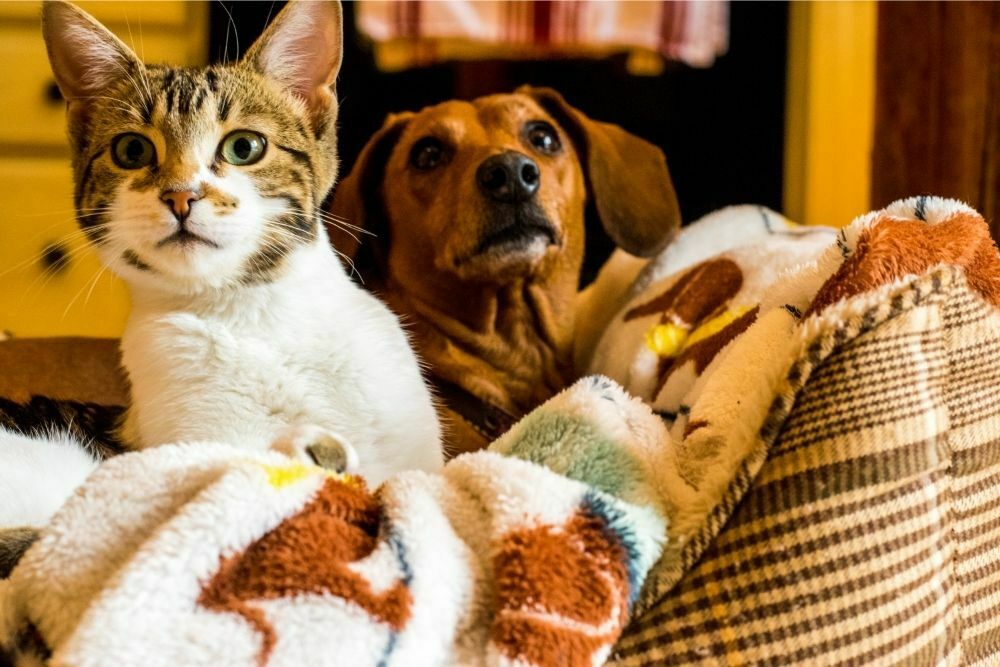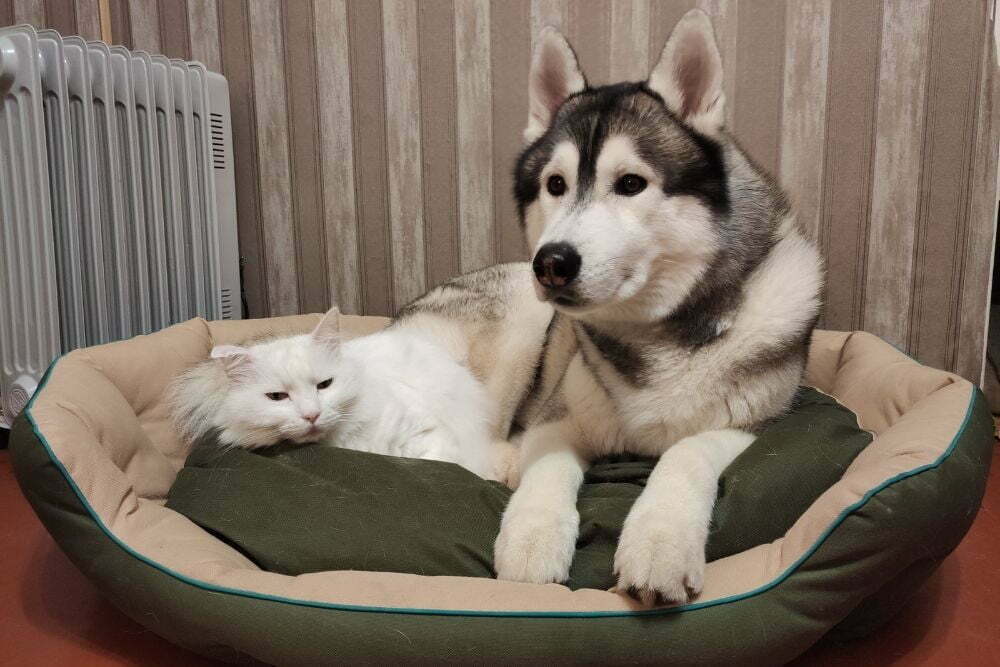The popular old myth about cats and dogs being the best of enemies and the worst of friends, while being based on broad observation and very little else, wasn’t exactly built on a strong foundation of truth.
We all know how much dogs love to chase cats and that cats are just as happy to put dogs back in their rightful place with a few well-timed swipes of their claws when they do chase them, but the reality of the canine feline dynamic and the relationship that exists between them is infinitely more complex than most of us were ever led to believe it is.
It’s a multi-layered tapestry that incorporates trust, loyalty, affection, and the reciprocal understanding that no matter what happens, the cat is always in charge.

It isn’t uncommon for cats and dogs to live together in the same household, and when they do, they almost always work out the fundamental principles and day-to-day mechanics of their own relationships.
This mutually agreed blueprint usually involves the cat eating the dog’s dinner, playing with his toys, and completely ignoring him until they both decide that it’s time to hit the hay, at which point, the cat usually climbs into the dog’s bed with him, and cuddles up with him.
And the dog? He just accepts everything that the cat does, because he knows, just like his best feline friend does, who the dominant partner is.
That might not be exactly the way that the friendship between your cat and dog works, but we’re willing to bet that there are some aspects of the atypical interspecies alliance that you recognize.
And for the most part, dogs and cats manage to blunder through their lives together by getting along as best they can.
Occasionally though, something happens that throws a wrench in the works of your happy pet household and threatens the harmony of the fragile accord that exists between your cat and your dog.
And the worst of these unfortunate incidents is when your cat starts peeing in your dog’s bed, which makes it impossible for them, and all too often you as well, to get a good night’s sleep.
Despite what you’re probably thinking in between the expletives that you’re muttering under your breath and the frantic attempts to clean the dog’s bed after the latest pee-gate incident, it isn’t an uncommon problem, and there are a number of easy ways to stop your cat using the dog’s bed as a makeshift toilet.
And because we’ve been through and have emerged, relatively, unscathed on the other side, we’re going to explain why it might be happening, and how to prevent it from happening in the future.
Why Is My Cat Peeing In My Dog’s Bed?
If you want to stop your cat peeing in your dog’s bed, then you need to find out why she’s suddenly started doing it.
And again, while you might want to believe that it has something to do with her directing her focused rage toward your dog in some Machiavellian scheme based on vengeance and the need to teach the dog a lesson, we can guarantee you that it isn’t the reason that your cat has started peeing in his bed.
We’re not saying that that thought hasn’t occurred to her and that she hasn’t contemplated it at some point, but it won’t be the reason that your cat is using your dog’s bed as a litter tray.
The reasons for the sudden change in her behavior won’t be that complicated and are usually due to three straightforward, and relatively simple to fix issues.
So let’s discuss the why first, and then move on to how to best address and solve the problem.
The Rigors Of Old Age And Possible Health Problems
Cats, like humans, aren’t immune to the effects of old age and unfortunately, one of the most common issues that a lot of elderly cats have to deal with is incontinence.
Your cat might not be choosing to pee in the bed that she shares with your dog, she just might not be able to help herself or be able to control her bladder the way she used to.
If this is the case, then you should really speak to your vet about it as they’ll be able to advise you on the best course of action to take, how to ensure that your cat is comfortable and that her incontinence is treated properly.
And they’ll also tell you to keep your dog’s bed fresh and clean so that he doesn’t mind sharing it with his aging companion.
It could, however, also be a sign (if she’s not elderly) that your cat is suffering from some sort of underlying health condition like a bladder or urinary infection, some sort of kidney issues such as stones or again an infection, or even early-onset diabetes.
Again, the best course of action, if this is the situation, is to take your cat to see the vet, who will be able to diagnose the problem fairly quickly.
Don’t worry and don’t panic, as they’re all easily treatable problems and conditions, and with the right medication and maybe a dietary change as well, things will soon get back to normal and the days of your dog waking up in a puddle of cat pee should soon be over.
Increased Stress And Heightened Anxiety
While they’re always in complete command of their territory and their domain, cats are creatures of habit and love the simplicity and effectiveness of routine.
They like things to remain the way they’ve always been and how they hope they always will be, and any change to the familiar patterns that they’re used to can cause them to feel anxious and increase their stress levels, which can be the root cause of them using your dog’s bed as a litter box.
Before you take your cat to the vets and try and work out a program of treatment, it might be worth taking a moment to consider what, if any recent changes have occurred in your home (for instance are you working longer hours and spending less time with your cat?) that might be having an impact on your cat, and how (if at all), you can resolve them.
Of course, the elephant in the room in this situation is usually canine-shaped and the stress and anxiety that your cat is experiencing could be directly related to your dog.
If your woofing chum and four-legged friend is a relatively recent addition to the house, then your cat might be peeing in his bed as a way of marking her territory.
These things tend to work themselves out over time, as your cat gradually becomes used to the presence of the new dog in her home.
The Position Of Her Litterbox
As ridiculous as it might sound, the reason your cat might be peeing in your dog’s bed could be due to something as simple as you’ve moved the position of her litter box, and she doesn’t know where to find it.
If you did move it, try moving her litter box back to where it used to be and where she expects to find it, and that might resolve the issue almost immediately.
And if you’ve changed litter brands, she may not like the odor or the feel of the newer litter and as result might be refusing to use her litter box. It might be worth thinking about moving back to the old brand, as cats prize and value the small things in life like bathroom comfort.

The Five Easy Ways To Stop Your Cat Peeing In Your Dog’s Bed
And, as we promised we would, in the beginning, we’re now going to guide you through the five easy steps you can follow and use to stop your cat from peeing in your dog’s bed.
Cleanliness
Cats are fastidiously clean animals, but once they’ve peed somewhere, they’ll follow their noses and keep returning to the same spot to pee time and time again.
That’s why you should take a leaf out of your cat’s book, follow their example and make sure that when you clean your dog’s bed, it stays odor-free.
Unfortunately, sticking it through the washing machine a couple of times won’t remove the smell, and you’ll be right back to square one as soon as it’s dry.
The only way to eliminate the smell completely is with a purpose-designed odor eliminator or by scrubbing the bed with a mixture of warm water and vinegar, and then sprinkling baking soda over the affected area to soak up all the residue.
Once the baking soda has finished doing its job and has been cleaned off the bed, it’ll be odor-free and as good as new.
Removing All Trace
It sounds unduly harsh, but sometimes you need to be cruel to be kind, and as cats thrive on a sense of familiarity, one of the safest ways to ensure the sanctity of your dog’s bed is by removing any evidence of your feline’s presence with an odor-free spray.
If it doesn’t seem familiar to your cat and only smells like your dog, there’s a good chance that she’ll start giving your dog’s bed a wide berth.
Calmness Is The Key To Feline Godliness
If you want to bring a little extra calm into your cat’s life and help to ease the stress and anxiety that she might be suffering from, a simple, effective, and straightforward way to do it is through the use of cat pheromones.
Most of the dispersal systems are plug and play, so all you need to do is plug one in, and it should reduce any stress or anxiety-related behavioral patterns in your cat. And the good news is, it’ll have absolutely no effect whatsoever on your dog.
Distraction Therapy
If your cat has become obsessed, via a combination of stress and anxiety, with peeing in your dog’s bed, you could try making her feel like the center of attention by spending more time with her or even giving her her own cat tree which should provide sufficient distraction and provide her with own space to retreat to whenever she begins to feel anxious.
Knowing that she has her own space, should be enough to curb her bedwetting and let your dog sleep in peace in his own, dry, bed.
You Gotta Keep Them Separated
If all else fails, the last resort involves separating your cat and dog at night, and locking your dog’s bed in a secure room that your cat can’t get into during the day.
Again, it’s the last resort and you should only ever think about keeping your dog and cat apart at night if everything else that you’ve tried to stop your cat peeing in your dog’s bed has failed.
